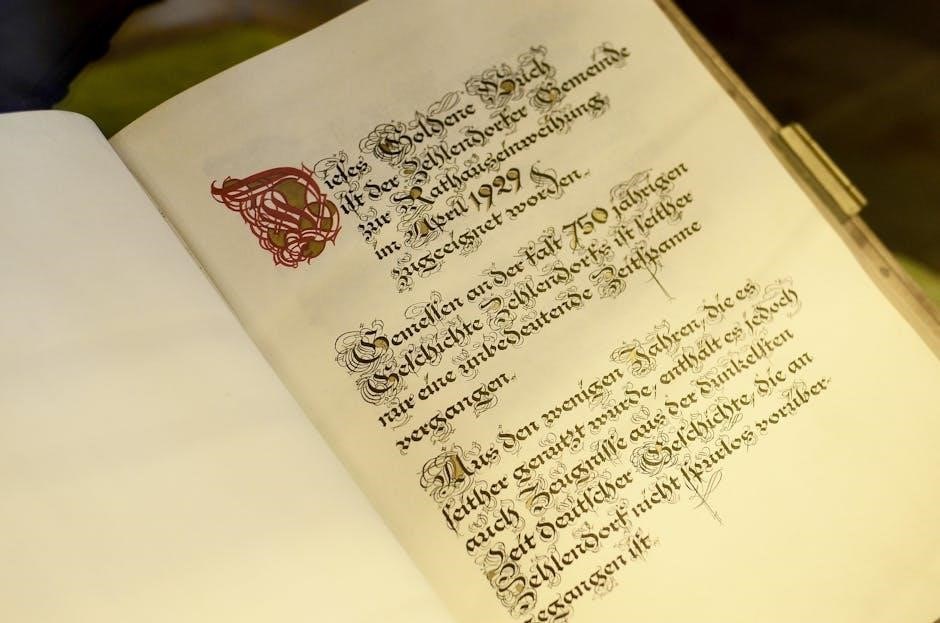The story of Icarus, a famous Greek myth, revolves around Daedalus and his son Icarus, who escape imprisonment using wings made of wax and feathers.
1.1 Overview of the Myth of Daedalus and Icarus
The myth of Daedalus and Icarus recounts their daring escape from King Minos’s imprisonment on Crete. Daedalus, a brilliant inventor, crafted wings from wax and feathers for himself and his son. Despite warnings to fly a middle course, Icarus soared too close to the sun, melting the wax and plunging into the sea. This tale symbolizes the dangers of overconfidence and the consequences of defying wisdom.
1.2 Historical Context and Sources
The myth of Daedalus and Icarus is deeply rooted in Greek mythology, with its earliest accounts in Ovid’s Metamorphoses and other ancient texts. The story has been retold in various forms of art and literature, making it a timeless allegory. PDF versions and study guides provide modern access to these classical sources, ensuring its enduring relevance and educational value.
Background of Daedalus and Icarus
Daedalus, a brilliant Athenian inventor, and his son Icarus were imprisoned on Crete by King Minos. Their story of ingenuity and tragedy has captivated centuries.
2.1 Daedalus: The Master Craftsman
Daedalus, renowned for his exceptional craftsmanship, was an Athenian inventor and engineer. He created the Labyrinth for King Minos and later devised wings for himself and Icarus to escape Crete. His ingenuity and skill in bending nature to his will made him a legendary figure in Greek mythology, symbolizing human ambition and creativity. His work laid the foundation for their daring escape.
2.2 Icarus: The Son and His Role in the Myth
Icarus, the son of Daedalus, is central to the myth as a symbol of youthful overconfidence. His impulsive decision to fly too close to the sun despite his father’s warnings led to his tragic fall. This act underscores the themes of hubris and the consequences of ignoring advice, making Icarus a poignant figure in Greek mythology. His story serves as a cautionary tale about human limitations.

The Escape from Crete
Daedalus crafted wings for himself and Icarus, enabling their daring escape from King Minos’s imprisonment. Their flight symbolized ingenuity and the pursuit of freedom.
3.1 The Construction of Wings
Daedalus meticulously crafted wings using feathers and wax for himself and Icarus. He gathered feathers of various sizes, arranging them to mimic bird wings. The wax, carefully applied, held the feathers in place, creating a lightweight yet durable structure. This ingenious invention allowed them to soar, symbolizing both human ingenuity and the quest for freedom from captivity.
3.2 The Flight and Its Consequences
The flight began with hope as Daedalus and Icarus soared above the Aegean Sea, their wings beating steadily. However, Icarus’s thrill overtook caution, leading him to fly too close to the sun. The wax melted, and his wings disintegrated, sending him plummeting into the sea. This tragic event underscored the perils of overconfidence and the importance of heeding advice, leaving a lasting lesson in its wake.

The Fall of Icarus
Icarus’s overconfidence led to his tragic demise as his wings melted from the sun’s heat, causing him to plunge into the sea, a poignant lesson in hubris.
4.1 Icarus’s Decision to Fly Too Close to the Sun
Icarus, exhilarated by flight, ignored his father’s warnings and soared higher, entranced by the freedom. The sun’s intense heat melted the wax holding his wings, leading to his catastrophic fall. This act of defiance symbolized youthful recklessness and the dangers of overconfidence, becoming a timeless cautionary tale in Greek mythology. His tragic mistake underscores human vulnerability.
4.2 The Tragic Outcome and Its Aftermath
Icarus’s wings disintegrated as the wax melted, sending him plummeting into the Aegean Sea. His father, Daedalus, helplessly witnessed the tragedy. The sea was later named the Icarian Sea in his memory. This event became a symbol of hubris and its consequences, serving as a poignant reminder of the dangers of overambition and the importance of heeding wise counsel.
Symbolism in the Story
The wings symbolize human ambition and the sun represents dangerous pride, while Icarus’s fall warns against hubris and the importance of balancing ambition with caution.
5.1 The Theme of Hubris and Overconfidence
Icarus’s tragic fall exemplifies the dangers of hubris and overconfidence. His disregard for his father’s warnings highlights how excessive pride can lead to downfall, serving as a cautionary tale about the consequences of ignoring advice and overestimating one’s abilities, a timeless lesson in humility and moderation.
5.2 The Representation of Human Ambition and Limitations
The story of Icarus reflects human ambition’s duality, showcasing both its potential and constraints. Daedalus’s ingenuity in crafting wings embodies the heights of human creativity, while Icarus’s tragic fall illustrates the dangers of unchecked ambition and the inevitability of natural limitations. This myth serves as a timeless reminder of the delicate balance between striving for greatness and respecting the boundaries set by nature.

Cultural and Artistic Impact
The story of Icarus has profoundly influenced art and literature, inspiring works like “The Lament for Icarus” and modern retellings in various media, including films and a concept album.
6.1 The Story in Art and Literature
The story of Icarus has been a timeless inspiration in art and literature, depicted in works like “The Lament for Icarus” by H.J. Draper and retold by authors such as Josephine Preston Peabody. It has also inspired modern adaptations, including a concept album and interactive PDF resources. The myth’s themes of ambition and tragedy continue to captivate artists, writers, and audiences across generations.
6.2 Modern Retellings and Interpretations
The story of Icarus has been reimagined in various modern forms, including a 27-track concept album, novels like “The Icarus Changeling”, and even video games such as Kid Icarus. These adaptations explore themes like regret and ambition, offering fresh perspectives on the classic myth. Additionally, PDF resources and educational materials have made the story accessible to new audiences, ensuring its enduring relevance.

Themes and Lessons
The story of Icarus emphasizes the dangers of hubris and overconfidence, teaching the importance of humility and the consequences of ignoring wise counsel.
7.1 The Importance of Listening to Advice

Icarus’s tragic fate highlights the crucial lesson of heeding advice. Daedalus warned his son to fly neither too high nor too low, but Icarus’s disregard led to disaster. This emphasizes the value of guidance and the consequences of ignoring wisdom, serving as a timeless reminder to respect experience and authority.
7.2 The Dangers of Excessive Pride
Icarus’s downfall exemplifies the peril of hubris. His pride fueled his reckless decision to fly too close to the sun, ignoring his father’s warnings. This myth underscores the consequences of overconfidence and arrogance, teaching that humility and moderation are essential virtues. The story serves as a cautionary tale about the dangers of allowing pride to cloud judgment.
Psychological and Philosophical Perspectives
The story of Icarus explores themes of ambition, identity, and the human condition, offering insights into the psychological concept of the “Icarus complex” and existential risks.
8.1 The Concept of Icarus Complex
The Icarus complex, derived from the myth, symbolizes excessive ambition and hubris leading to downfall. It psychologically represents individuals who disregard boundaries, driven by overconfidence, often resulting in self-destructive behavior. This concept is used to analyze personality traits and caution against reckless pursuits, highlighting the dangers of unchecked ego and the importance of humility in human endeavors.
8.2 The Story as a Metaphor for Human Nature
The story of Icarus serves as a universal cautionary tale about human ambition and its limits. It reflects the duality of human nature: the desire for freedom and transcendence versus the perils of hubris and overconfidence. Icarus’s tragic fall symbolizes the consequences of ignoring wisdom and the natural order, offering a timeless lesson on balancing aspiration with humility and self-awareness.
Educational Resources and PDFs
Numerous PDFs and educational materials about the story of Icarus are available online, including e-books, study guides, and interactive activities for classroom use.
9.1 Available PDF Versions of the Story
The story of Icarus is widely available in PDF formats, offering convenient access to the myth. Resources like “The Fall of Icarus” by Mary Hoffman and “The Story of Icarus” from Shotley Hall Primary School provide detailed narratives. These PDFs can be downloaded from educational websites, libraries, and online bookstores, making them accessible for readers worldwide. They often include interactive activities and study guides for deeper engagement.
9.2 Study Guides and Teaching Materials
Educators and students can benefit from study guides and teaching materials accompanying the Icarus story. These resources, available as PDFs, include differentiated reading comprehension activities, lesson plans, and interactive exercises. They are designed to enhance understanding of the myth, its themes, and cultural significance, making them invaluable tools for classroom use and independent study. Many are free to download, supporting diverse learning needs.
The story of Icarus remains a timeless tale of ambition and caution, offering universal lessons on hubris and the consequences of overconfidence, still resonating today.
10.1 The Enduring Legacy of the Story
The story of Icarus has left an indelible mark on art, literature, and culture. Its themes of ambition, hubris, and the consequences of overconfidence continue to resonate universally. From ancient Greek pottery to modern retellings, the myth serves as a timeless cautionary tale, inspiring reflection on human nature and the boundaries of innovation. Its legacy endures, transcending generations and cultural boundaries.
10.2 Final Thoughts on Its Relevance
The story of Icarus remains deeply relevant, offering timeless lessons on ambition, hubris, and the consequences of exceeding limits. Its universal themes resonate across cultures, inspiring reflection on human nature and the balance between innovation and caution. As a metaphor for modern challenges, the myth continues to captivate, ensuring its enduring impact on art, literature, and psychological discourse. Its relevance endures, shaping new interpretations and insights.

References and Further Reading
For deeper exploration, refer to Ovid’s Metamorphoses, Josephine Preston Peabody’s Old Greek Folk Stories Told Anew, and various PDFs available on educational websites like shottonhallprimary.durham.sch.uk.
11.1 Recommended Books and Articles
For a deeper understanding, explore Ovid’s Metamorphoses, which details the myth in Book VIII.
Josephine Preston Peabody’s Old Greek Folk Stories Told Anew offers a retelling of the Icarus myth.
Additionally, The Icarus Changeling by Timothy Zahn provides a modern twist.
Downloadable PDFs like The Story of Icarus from educational websites are also excellent resources.
These works provide diverse perspectives on the timeless tale.
11.2 Online Resources and Downloads
The story of Icarus is widely available in PDF format on educational websites like Shotton Hall Primary and Classictales.co.uk. Additionally, interactive PDFs like LKS2 Mythical Stories from Different Cultures and workbooks based on Mary Hoffman’s A First Book of Myths can be downloaded for educational purposes. These resources offer comprehensive study guides and engaging activities.
